As Ireland's homeless crisis continues conmen are cashing in as a highly effective male-dominated, hierarchical business of fake rough sleepers begging for money are cleaning up
It's a pathetic sight. Someone hidden deep down in a sleeping bag on the footpath. Beside is an empty coffee cup placed upright in a shoe and a sign in childish writing that reads: HOMELESS. HELP FOR HOSTEL. GOD BLESS.
He's there every weekend in Howth, the picturesque fishing village on the north side of Dublin that has become a popular day trip for tourists staying in the city. His chosen spot is on the path around the harbor front.
It's highly effective. Many of the thousands of tourists who pass by on the way to walk the piers and dine in the fish restaurants stop in guilty concern and drop a few euro in his cup.
The locals like me who live in Howth know better. We see him arriving in the mornings off the DART (the local train from the city center) with his shoulder bag containing his sleeping bag, blanket, food, and his sign.
We see him sitting on a bench on the harbor path having a takeaway coffee and a smoke and tapping on his phone before he decides it's time to start. He then takes off his trainers, puts up his sign and the empty cup, slides into the sleeping bag on the path and pulls the top over his head.
Having assumed the pathetic position, he lies there all day, emerging briefly now and then to empty the cup. Presumably, he's on his phone underneath the covers. Maybe he watches Netflix to pass the time. He will be doing this all summer.
One thing is a bit of a giveaway. He's only "homeless" at the weekends or on holidays like St. Patrick's Day when he knows Howth will be full of tourists. The rest of the time he's probably working other scams in the city center.
Locals who are concerned about the impression this gives visitors to Howth have tried to talk to him, but he shrugs to indicate he can't speak English. Sandwiches he has been given ended up in the nearest bin. At the end of the day, he gathers up his stuff and heads back into the city on the DART.
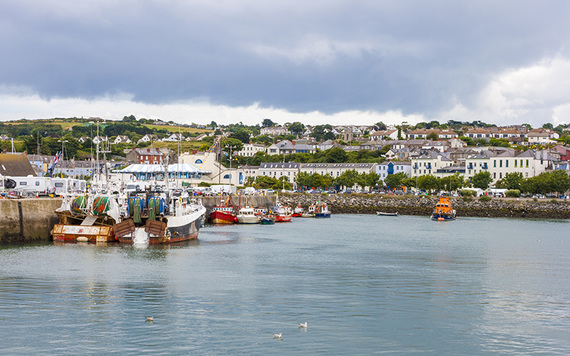
The town of Howth, in north Dublin.
He is just one of dozens of professional beggars now operating in Dublin, most of them from Eastern Europe and Romania in particular. It's a real problem, one that is causing growing concern to the Joint Policing Committee in the city which commissioned a survey over a year ago.
This found that begging was the top negative among visitors to the city, making them feel uncomfortable, guilty and at times afraid. The tourist body Failte Ireland says that it is the most frequently mentioned complaint made by visitors here.
Walk through the main shopping areas in the city center these days and you find beggars everywhere. On Nassau Street last week, where buses drop off tourists visiting Trinity College, the Kilkenny Shop and Grafton Street, we passed seven beggars in less than 100 yards. It's the same around Stephen's Green or Temple Bar, especially in the evening.
Just a few months ago in Dublin gardai arrested over 40 people in one weekend as part of a crackdown on organized begging rings, mainly involving extended Roma families who live in overcrowded cheap accommodation in the inner city and the outer suburbs. These groups are professional beggars, wise to the most effective methods of getting money and the shortcomings of the law.
Many of those involved are women in traditional Roma dress who are assigned spots by the (male) organizers, outside hospitals, churches, train stations, shopping centers and so on. They squat on the pavement all day with their cups held out, beseeching help.
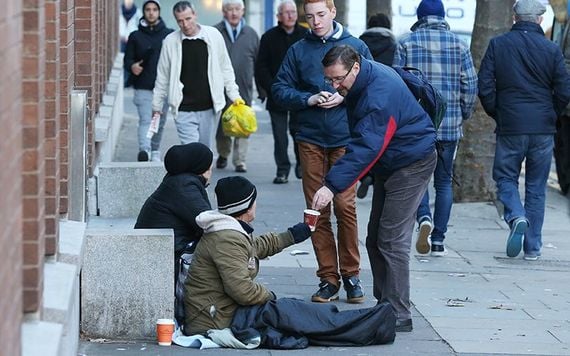
Begging on the streets of Dublin.
Some, like the woman who has been outside the Mater Hospital for several years, are always in the same place. Others are rotated around various positions, usually when the gardai arrive to ask questions. In the evening the organizers collect the money and have been seen changing the coins for notes in shops before they all head off for the night to where they are living.
These groups are not homeless. It's a highly organized, male-dominated, hierarchical business. Gardai believe much of the money ends up with the Mr. Big of each clan, often living back in Romania.
The level of organization among some groups is impressive. Gardai believe that some arrive on cheap flights from Eastern Europe to spend a few weeks here at a time, and their activity includes begging scams, aggressive begging, and petty crime like bag snatching, phone thefts and stunts at cash machines.
And they don't give up. One woman who appeared in court in Dublin on begging related charges was arrested in Cork a few days later for the same behavior. At the same time in Cork, a search by gardai found that many of a group arrested there for aggressive begging had return tickets for flights back to Romania.
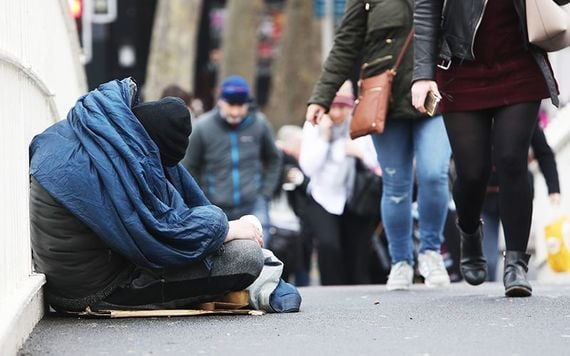
Begging on the streets.
It's not just begging scams like the "homeless" man in Howth that cause problems. Worse are the aggressive beggars who roam the city center in Dublin in the evenings targeting people who are sitting at outside tables at restaurants and bars in places like Temple Bar and the side streets off Grafton Street and Georges Street.
These beggars lean over barriers, and their appeals for money quickly turn to intimidation and shouting if cash is not forthcoming. For women sharing an outside table on a night out this can be very disturbing.
Gardai and business owners believe that on an average night in Dublin there are now at least 100 active beggars in the city center, with the number rising even higher in the peak summer months. The majority of them are Eastern European.
There are, of course, some locals among the beggars, mainly people with drug and alcohol problems and mental health issues. This group includes a hardcore of rough sleepers who for various reasons refuse to use the hostel accommodation that is available. The increased emergency accommodation in Dublin means that there is a bed for everyone who wants one on most nights.
A very small number of those begging include people affected by the housing crisis and high rents but there are solutions available to keep them off the streets, usually provided quickly after they engage with the system.
All of this puts the "homeless" sign used by the Howth footpath sleeper in context. He's not homeless. Like the majority of the beggars now plaguing Dublin, he is using the emotional reaction that homelessness evokes to scam money from people, particularly tourists.
It is unclear whether the begging problem here is significantly worse than in London, Paris or other European cities. But it is certainly true that the weak laws that apply here are making the problem worse and may be attracting beggars from other countries to operate here.
Begging was always illegal here under the Vagrancy Act of 1847, but that ended after a constitutional challenge in 2007. The result is that begging is no longer illegal here unless it contravenes certain rules and there are humane reasons why that should be the case.
There will always be genuine people who find themselves in desperate situations in which begging is their only way of getting past a crisis. As long as they don't make a nuisance of themselves and they beg in a restrained manner, the law should give them a pass.
But aggressive begging and organized begging as a permanent way of life is different. The problem this poses has been growing for some time now.
As a way of striking a balance, the Criminal Justice (Public Order) Act 2011 was introduced to give gardai more powers to deal with aggressive beggars. It is now illegal for a beggar to harass, intimidate, assault or threaten anyone or to obstruct anyone or cause an obstruction while begging. The new law also makes it illegal to beg in certain places, such as at the entrances to business premises, near ATM cash machines, and in other areas.
If gardai find that beggars are breaking the law they can, of course, arrest and prosecute them, although the reality is that proving such cases in court can sometimes be difficult. The professional beggars from Eastern Europe are well aware of this and of their entitlement to free legal aid.
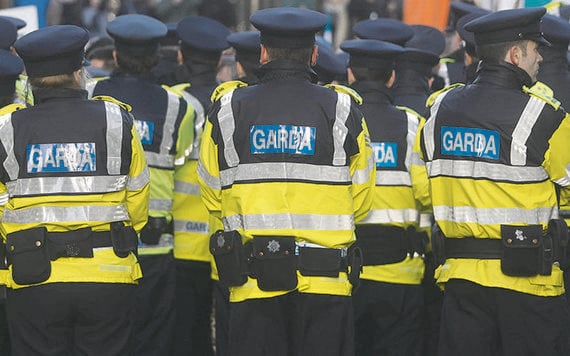
What can police do about begging in Ireland?
That explains why very often the gardai prefer simply to tell beggars to "move on," which they are empowered to do under the law. Business people in the city say this is hopeless since as soon as the gardai have gone, the beggars come back.
In the case of our sleeping bag beggar in Howth, he is clearly not being aggressive, since he is just lying there. Proving that his sleeping bag is causing an obstruction (which it is when the path is full of tourists) may not be that easy in court. Nor may it be easy to prove that his claim to be "homeless" is a lie, and even if it could be proven in court it probably does not make his begging illegal.
So, in spite of the embarrassment, he is causing to tourism in the area, our sleeping bag beggar in Howth is likely to be a permanent fixture for the foreseeable future. Likewise, the horde of professional beggars in Dublin city center. That is until our politicians come up with revised legislation to tackle the problem in a much more robust manner -- and there are no signs of that happening anytime soon.
In the meantime, there's a simple message in all of this. If you are coming here on vacation, do not give money to beggars on the street.
If you are concerned about poverty, homelessness or rough sleepers there are established charities here who do good work and who know who the scammers are. Give them the money instead.
Read more: Dublin-based child porn facilitator extradited to US, Dept of Justice announces
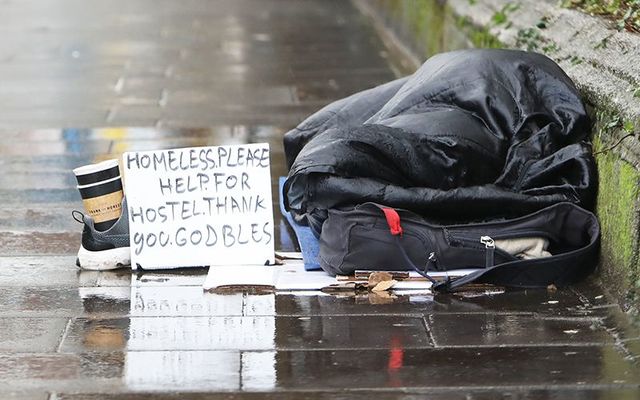



Comments